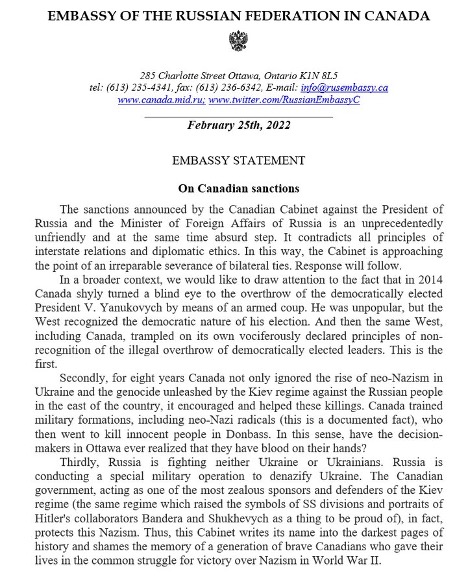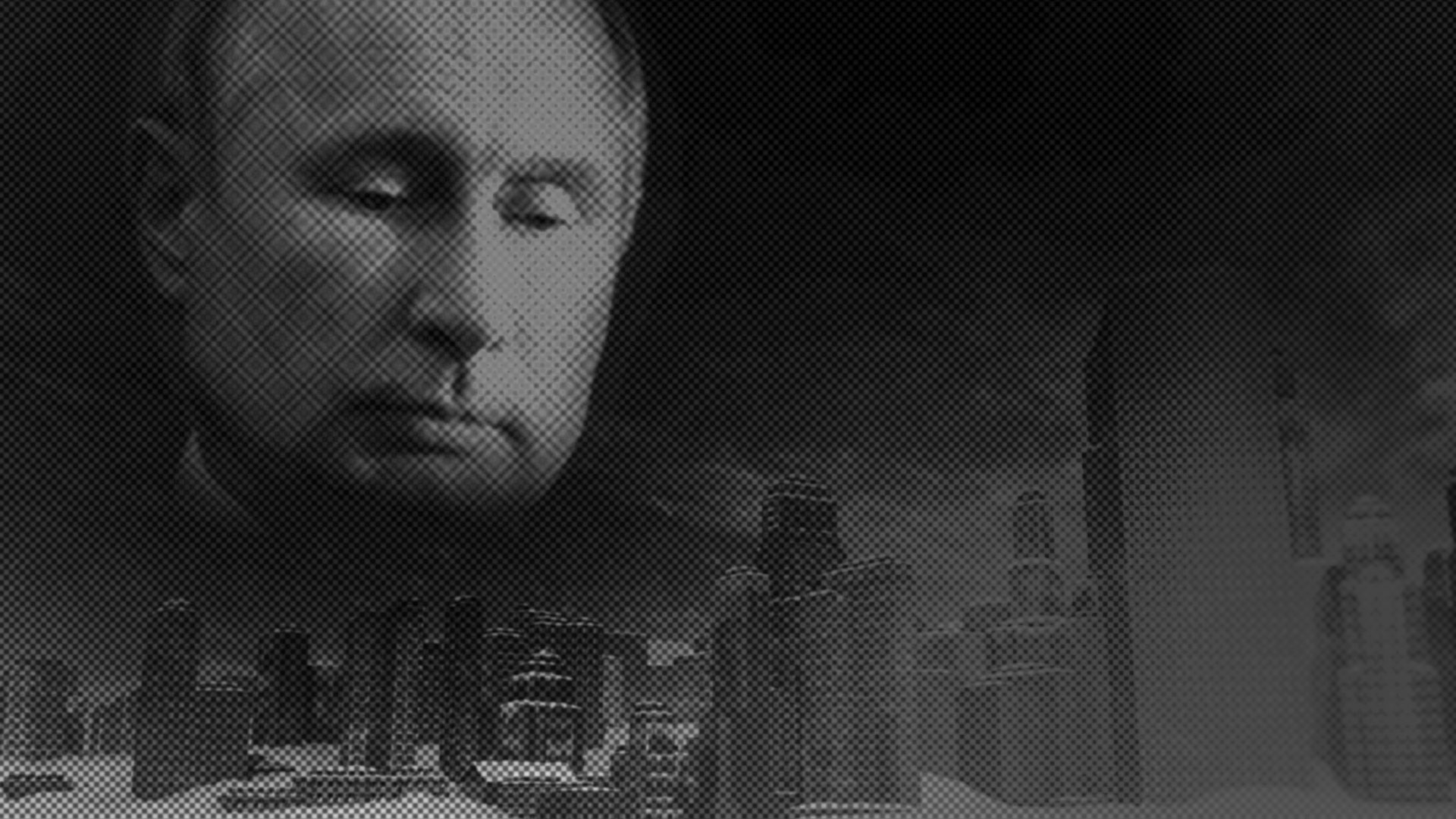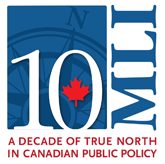Disinformation narratives deployed by the Russian government in the months leading up to its invasion of Ukraine and afterwards have shifted over the past months to justify its invasion, erode Western support for Ukraine and undermine Western sanctions.
In a speech given in early September, Vladimir Putin repeated multiple Russian disinformation narratives, including a blanket denial of Russian responsibility for its invasion of Ukraine and it’s ongoing military operations in Ukraine, stating that “We did not start anything in terms of military action. We are trying to end it.”
Russia first invaded Ukraine in 2014 in Crimea and parts of Eastern Ukraine and the latest offensive, starting on February 24, 2022, has resulted in thousands of civilian deaths, 12+ million displaced people, the forced deportation of upwards of 1.6 million Ukrainians and multiple accusations of atrocities and war crimes.
In the weeks leading up to and following the invasion, Russian information operations targeting Ukraine and NATO intensified.
On February 25, 2022, the day following Russia’s invasion, the Russian embassy in Canada issued an official statement on Twitter that identifies the core narratives used by the Russian government to to justify and reject responsibility for its unprovoked invasion of Ukraine (full image of statement below).
The statement falsely accuses Canada of encouraging and helping the “killing” of Russians in Eastern Ukraine and claims that Canada helped train “neo-Nazis” to undertake these killings.
The initial false Russian claim about a limited operation to “de-Nazify” Ukraine is featured prominently in the official statement. While this narrative has been broadly dismissed by Western governments and media, efforts by the Russian government to connect Ukraine with “neo-Nazism” persist on state media platforms and are amplified by Kremlin aligned far-left and far-right activists and groups in western nations.
A recent meme shared on social media deployed a photo of Adolf Hitler with the family of Nazi propganandist Josef Goebbles that falsly identified Magda Goebbles as the grandmother of Canadian Deputy Prime Minister, Chrystia Freeland. This disinformation is intended to undermine Ms Freeland’s credibility both on Ukraine related issues and more broadly.

The amplification of Russian “Nazi/fascist” related narratives is not limited to far-right activists and groups. An opinion piece posted to a far-left Canadian platform that coincided with Canada’s August 23rd Black Ribbon Day, a national day of remembrance for the victims of Nazi and Soviet communist terror, identifies all of the European victims of communism as “Nazis enemies and their supporters.”

Similar false generalizations were deployed by Russian Soviet era propagandists during the Cold War to discredit critics of the Soviet regime, including the Ukrainian and Central and Eastern European refugee communities in Canada and elsewhere around the world. When immigrant refugee communities are targeted with such false generalizations, they are intended to dehumanize, delegitimize and ultimately, silence them.
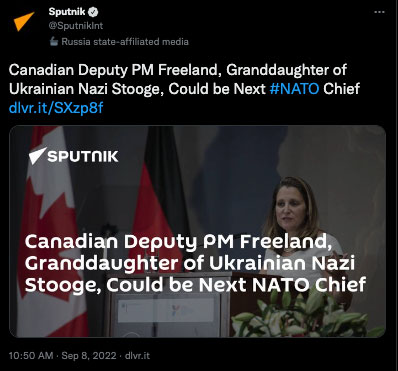
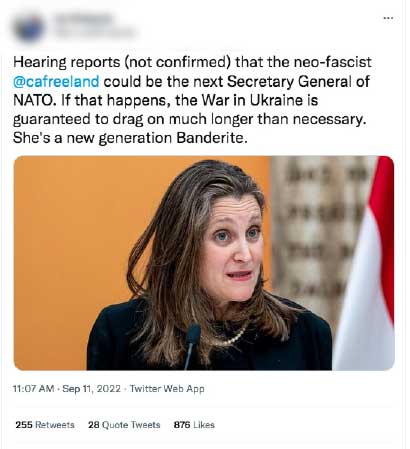
Sanctions Disinformation
Over the course of the Russian invasion, and in response to Western sanctions and support for Ukraine, the Putin regime has developed new narratives to exploit rising energy costs and inflation by pointing to Western support for Ukraine and sanctions on Russia as their primary cause.
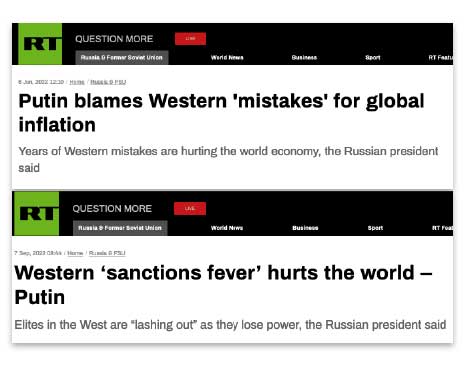
Russian state owned gas company, Gazprom, produced an ominous video to warn Europeans of a coming deep freeze in the coming winter if sanctions are maintained.
Some of these targeted narratives have seeped into far-left/right media in the democratic world and have been used to justify protests by anti-government/anti-establishment groups in Europe, who have called for an end to sanctions against Russia.
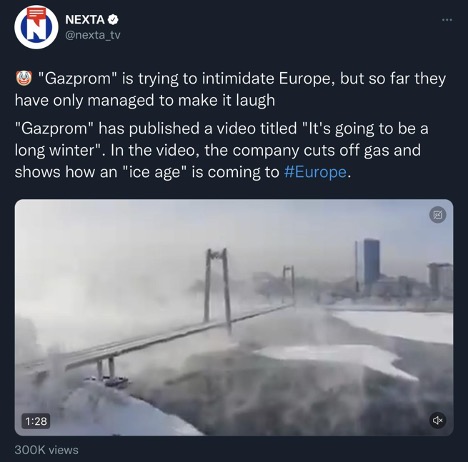
Where Russian information operations have not successfully mobilized local activists, members of the Russian diaspora have stepped in as cut outs, as they did in Cologne in early September. Russian narratives about sanctions causing “chaos” and fears about “how will we survive this winter?” are central themes in these protests and are intended to contribute to the erosion of support for sanctions and Ukraine.
Mainstream right wing media have also fallen victim to these emerging Russian narratives. During his show in late August, Fox News personality, Tucker Carlson, explicitly called for ending sanctions on Russia. Carlson claimed that such a move would stabilize Western economies, stating that the West should “reestablish energy flows into Europe and save the global economy including ours”.
“Everything depends on cheap energy, but Europe no longer has it, and as a result, things are falling apart very quickly,” he said.
Of US President Joe Biden’s support for Ukraine, Carlson said “This is nuts. It makes no sense. In fact, it only makes sense if the goal is to completely destroy the west…. What would be the other explanation for this behavior?”
The Russian government has exploited Carlson’s points to support its information operations. Shortly after the Russian invasion of Ukraine, Russian intelligence sent a memo to Russian government spokespeople and propagandists instructing them to promote and amplify clips from Carlson. Part of the leaked memo read:
“It is essential to use as much as possible fragments of broadcasts of the popular Fox News host Tucker Carlson, who sharply criticizes the actions of the United States [and] NATO, their negative role in unleashing the conflict in Ukraine, [and] the defiantly provocative behavior from the leadership of the Western countries and NATO towards the Russian Federation and towards President Putin, personally.”
A July 2022 rant by Tucker Carlson was promoted by Russian State media to justify its narratives about Ukraine. An RT headline reported, the Carlson slammed “‘corrupt’ Ukraine”.
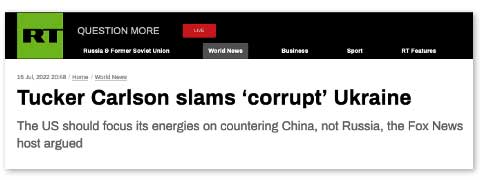
Russian information operations are adept at recognizing opportunities to manipulate reality and narratives to maximize their potential to polarize western debate to their own benefit. In the context of sanctions, the Kremlin’s ultimate objective is to manipulate Western societies and governments to believe that Western sanctions don’t hurt Russia; but that they hurt those who impose them on Russia instead.
Other conspiracy narratives falsely claim that the US is intentionally prolonging the war in Ukraine to control, weaken and even “destroy Europe”.
Vladimir Putin doubled down on false Russian government claims about western sanctions in a speech he gave at the Russian Eastern Economic Forum in early September 2022.
During his speech he claimed that Russia is relatively unaffected by Western sanctions and that current Western economic “turmoil is the result of conscious decisions made by Western nations …. The West caught “sanctions fever” as it sought to impose its will on other nations.”
Putin continued to attack democratic governments, accusing them of seeking to “preserve the old world order, which benefits only them, to make everyone follow the ‘rules’ they invented themselves and which they regularly break or change to their benefit.”
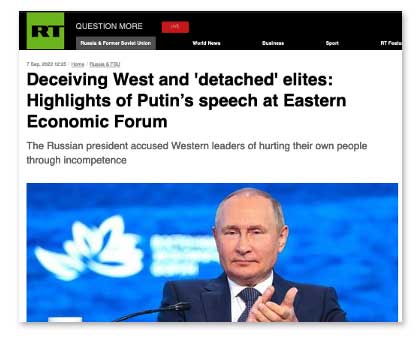
He further accused western governments of adopting policies that “run counter to the public’s interests, which they are supposed to protect – this shows the Western elites are “detached from their own people.” Sanctions on Russian he falsely claimed, are denying western companies the ability to compete in general.
Some Canadian anti-government and anti-vaccination groups and activists have fallen victim to these narratives and have amplified them to followers on social media. The Twitter account of an anti-vaccination/anti-lockdown group identifying itself as The Line Canada, which as been banned from the platform since July, tweeted pro-Kremlin narratives immediately after the invasion of Ukraine.
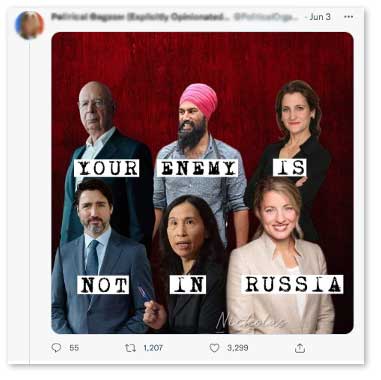
Kremlin Aligned Media: NATO is responsible for attack on Izium
A report in one of Russia’s largest daily tabloids, Komsomolskaya Pravda, claims that it was not Ukraine but NATO that was responsible for liberating Izium from Russian occupation. The September 12, 2022 article points to social media posts uploaded by foriegn volunteers fighting for Ukraine as evidence.


Several thousand volunteers have joined the International Legion of Territorial Defense of Ukraine, however they do so as independent volunteers, and not as members of any other national armed forces. These include volunteers from non-NATO nations, like Georgia.
According to Russian disinformation analyst Julia Davis, Russian state media has intensified its claims that Russian troops in Eastern Ukraine are fighting NATO.
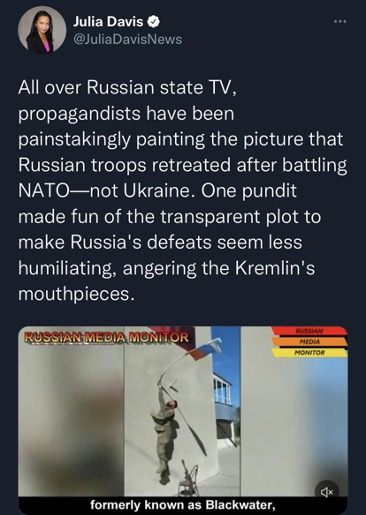 Russian information operations have consistently blamed NATO and the western world for the war in Ukraine. Presenting Russia as a victim of NATO helps Vladimir Putin maintain his image as Russia’s defender, leading to greater support for his regime. In the democratic world, this claim is intended to erode public support for Ukraine and is amplified by far-left/right groups that are critical of western governments.
Russian information operations have consistently blamed NATO and the western world for the war in Ukraine. Presenting Russia as a victim of NATO helps Vladimir Putin maintain his image as Russia’s defender, leading to greater support for his regime. In the democratic world, this claim is intended to erode public support for Ukraine and is amplified by far-left/right groups that are critical of western governments.
Russian Embassy in Canada Statement on February 25th, 2022:
